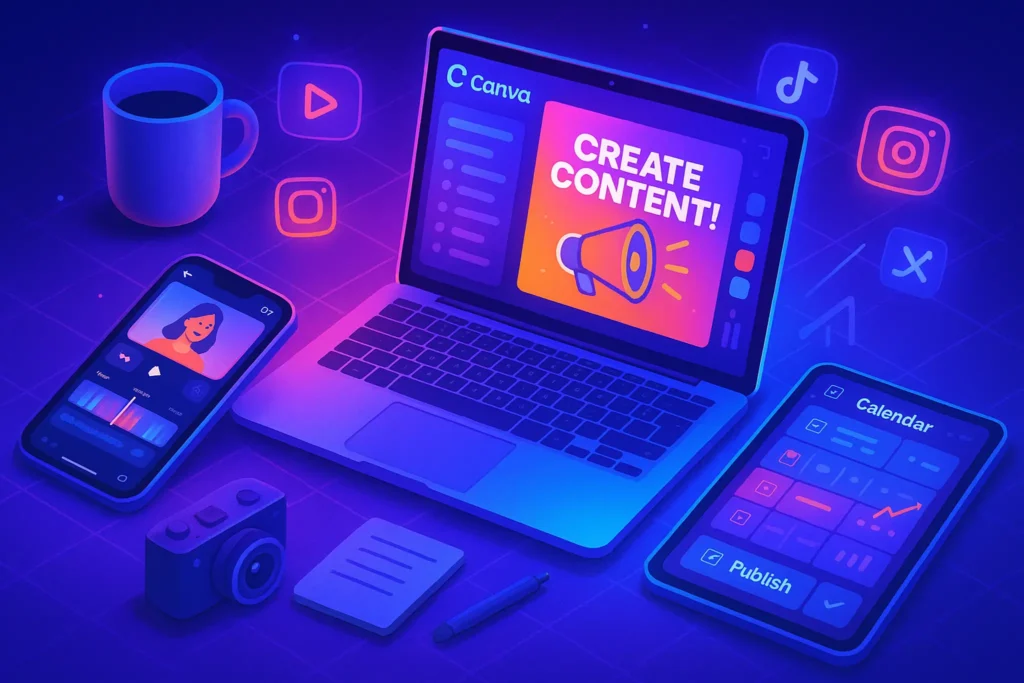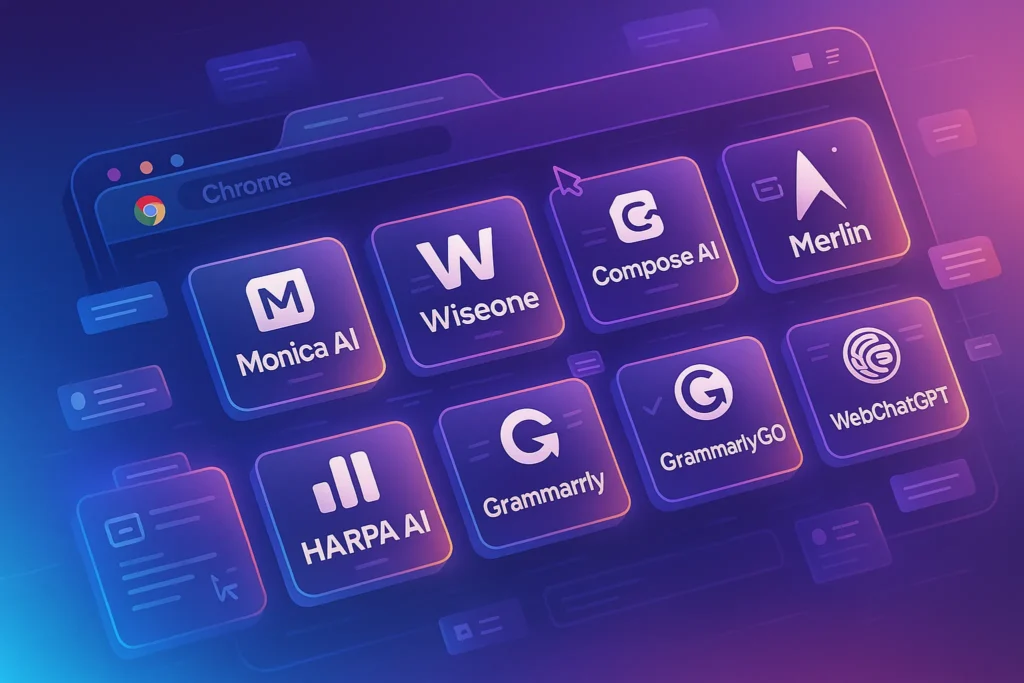🎯 Why Having the Right Tools Matters in 2025
Creating standout content is harder than ever. The pace is fast, algorithms are demanding, and audiences expect polish. Whether you’re building your brand on Instagram, YouTube, TikTok, or Substack—your toolkit matters.
That’s why in 2025, content creators are leaning heavily on purpose-built apps to streamline their workflows. From editing vertical videos on the go to generating captions with AI and scheduling posts across platforms, the right tools save time, improve quality, and help you stay consistent.
In this post, we’ll break down the best content creation apps across 5 essential categories—each handpicked for usability, versatility, and time-saving impact.
🎨 Graphic Design Apps for Creators
Creating compelling visuals is a non-negotiable part of content creation in 2025. Whether you’re building Instagram carousels, YouTube thumbnails, blog headers, or promo materials, design is often the first impression your content makes. These tools stand out not just for their features—but for how they integrate into a content creator’s daily workflow.
✅ Canva – The All-in-One Visual Design Platform
What it is:
Canva has evolved far beyond a drag-and-drop tool. In 2025, it’s a full-stack content design suite with integrated AI layout suggestions, brand kits, animated templates, and even Magic Studio for generating content from a single prompt.
Why creators love it:
-
You can design cross-platform visuals in one shot (YouTube thumbnail + IG carousel + LinkedIn banner).
-
With the Brand Kit, creators can lock in consistent fonts, colors, and logos—perfect for maintaining a personal brand.
-
Magic Resize saves massive time by automatically adapting your content to different formats (e.g., Reels → Story → Post).
Real Use Case:
You’re preparing a content drop for your new online course. Canva lets you batch-create launch graphics, lead magnet PDFs, IG promo carousels, and even a branded lead capture form—without leaving the app.
Pros:
-
Incredibly fast, especially for batch design
-
Massive free asset library (photos, icons, video, audio)
-
Collaboration tools for teams or VAs
-
New “AI Image Generator” for branded visuals
Cons:
-
Limited flexibility for advanced animation
-
Desktop editor still smoother than mobile version
Related Tip: Want to level up your graphic workflow? Learn how to design infographics that actually convert with Canva’s new AI layout suggestions.
✅ Adobe Express – Power Meets Simplicity
What it is:
Adobe Express brings the professional quality of the Adobe ecosystem into a lightweight, browser- and mobile-based platform. You get Adobe Fonts, Stock access, and premium-level typographic control with none of the Photoshop complexity.
Why it matters:
Adobe Express is ideal for creators who want more polish than Canva allows, especially if your content is portfolio-based or client-facing.
Real Use Case:
A freelance designer uses Adobe Express to create animated IG story ads with layered fonts, licensed images, and brand animation presets—all within minutes.
Pros:
-
Built-in Adobe Stock for easy high-end asset access
-
Better animation & font control than Canva
-
Syncs with Photoshop/Illustrator files
-
Mobile-friendly with responsive export formats
Cons:
-
Smaller template library than Canva
-
Slight learning curve if you’re new to Adobe UI
✅ VistaCreate – The Localization King
What it is:
Previously known as Crello, VistaCreate has quietly grown into a favorite for global creators. It shines where others don’t—template localization, animated formats, and ready-to-post ads for niche regions and platforms.
Use Case:
Running a bilingual content channel? VistaCreate’s multi-language templates and right-to-left design support make it a breeze to create parallel content versions.
Pros:
-
Templates for non-English markets
-
Rich animation options and motion presets
-
Easy social video creation with transitions
-
Affordable premium tier
Cons:
-
Less known = smaller community/tutorial support
-
No deep integration with AI tools (yet)
🎬 Video Editing Tools for Creators
In 2025, video dominates nearly every platform—from TikTok and YouTube Shorts to Instagram Reels and beyond. Whether you’re editing short-form content on your phone or polishing full-length YouTube videos, the right tool can help you move faster without sacrificing quality.
✅ CapCut — The Ultimate Mobile Editing Companion
What It Is:
Originally known for its tight integration with TikTok, CapCut has grown into a full-featured mobile video editing suite. In 2025, it offers auto-captions, AI-powered cleanups, beat-synced transitions, and trending template suggestions—all optimized for mobile content creators.
How It Helps Creators:
-
Design fast, polished Reels and Shorts directly from your phone
-
Use prebuilt templates and trending styles to align with platform algorithms
-
Add auto-subtitles and voice sync with minimal effort
Real Use Case:
A solo creator batch-edits five Instagram Reels with trending audio, animated text overlays, and jump cuts—all in less than an hour using CapCut’s AI templates.
Pros:
-
Super intuitive UI for non-tech users
-
Auto-subtitle generator + TikTok audio syncing
-
Vast template library and AI smart cuts
-
Exports clean, platform-ready vertical videos
Cons:
-
Limited for complex multi-layer timelines
-
Some features only available on desktop
Want to go deeper into how creators are leveraging tools like CapCut in 2025? Don’t miss our breakdown of Video Marketing Trends.
✅ VN Editor — Mobile Editing With Pro-Level Precision
What It Is:
VN (VlogNow) is a robust mobile editor that feels like a desktop timeline packed into your phone. With support for custom LUTs, keyframe animations, and multi-track timelines, VN gives creators fine-grain control over every edit.
How It Helps Creators:
-
Ideal for YouTubers, vloggers, and mobile filmmakers
-
Offers advanced editing capabilities (e.g. speed curves, motion blur)
-
Compatible with desktop workflows via cloud syncing
Real Use Case:
A travel content creator shoots cinematic drone footage and edits it into a stunning Instagram Reel using VN’s color grading tools and seamless transitions—no laptop needed.
Pros:
-
Supports HDR, ProRes, and 4K exports
-
Multi-track timeline and professional audio tools
-
No watermark—even in the free version
Cons:
-
Steeper learning curve than CapCut
-
Requires more device storage and performance
Many of the creators featured in our Top Content Creation Tools for Social Media rely on CapCut to accelerate production without compromising polish.
✅ InShot — Quick, Clean, and TikTok-Ready
What It Is:
InShot is one of the most downloaded mobile editors for a reason. With easy trim tools, music syncing, and optimized export settings for all platforms, it’s the go-to app for creators who prioritize speed and style.
How It Helps Creators:
-
Perfect for rapid, visually-appealing edits on the fly
-
Built-in libraries of transitions, stickers, music, and fonts
-
Auto-formatting for Reels, Stories, and TikTok
Real Use Case:
An entertainment creator uses InShot to turn raw smartphone footage into a polished short with captions, audio overlays, and beat-synced cuts in just 10 minutes.
Pros:
-
Very beginner-friendly and mobile-optimized
-
Strong support for vertical aspect ratios
-
Quick exports with low file sizes
Cons:
-
No true multi-layer editing
-
Many features locked behind premium
📬 Want More Tools That Level Up Your Workflow?
Join our free newsletter to get weekly insights on creator tools, productivity hacks, and emerging apps—delivered right to your inbox.
🔐 No spam. Just useful stuff to help you create smarter and faster.
✍️ Writing & Copy Tools for Creators
Whether you’re scripting a YouTube video, writing a blog post, or crafting social captions, your ability to communicate clearly and creatively sets the tone for your brand. These tools aren’t just time-savers—they help creators write smarter, faster, and more strategically.
✅ Notion AI — Your Personal Brainstorming Assistant
What It Is:
Notion AI brings AI into your workspace without adding noise. It lives inside your notes, pages, and databases—generating text, summarizing ideas, rewriting copy, and even suggesting outlines.
How It Helps Creators:
-
Write social captions based on long-form content
-
Instantly generate blog post outlines or video scripts
-
Summarize interviews or research for repurposing
Real Use Case:
A content creator drafts a 10-minute video script using just a few bullet points in Notion AI. With one click, it expands into a fully structured narrative—ready for editing.
Pros:
-
Native integration within your productivity tool
-
Great for outlining, rewriting, or expanding content
-
AI stays context-aware inside your notes
Cons:
-
Lacks depth for long-form storytelling compared to Jasper
-
Requires premium plan for full AI access
Using Notion? Discover how to elevate your content with ChatGPT and combine both for maximum productivity.
✅ Jasper — Long-Form Content Creation, Powered by AI
What It Is:
Jasper is built specifically for marketers and content creators. It specializes in blog posts, product descriptions, YouTube scripts, and marketing emails—with dozens of templates and tone controls.
How It Helps Creators:
-
Draft long-form posts faster than ever
-
Maintain brand voice across platforms
-
Integrate with Surfer SEO for content ranking
Real Use Case:
A solo founder uses Jasper to write three blog posts a week, each SEO-optimized with headlines, CTAs, and embedded value—all generated within one dashboard.
Pros:
-
Advanced command system for precise writing
-
Built-in tone, audience, and format controls
-
Integrates with SEO and brand frameworks
Cons:
-
Can feel robotic without careful prompts
-
More expensive than lighter tools like Grammarly
✅ Grammarly — More Than Just a Spellchecker
What It Is:
Grammarly has matured into a smart writing assistant that not only corrects grammar, but also helps you improve clarity, tone, delivery, and engagement. In 2025, its AI even suggests alternative phrasing based on audience and goal.
How It Helps Creators:
-
Sharpen your YouTube scripts or tweets
-
Keep your tone consistent across blog posts
-
Improve audience trust with clean, clear copy
Real Use Case:
A YouTuber uses Grammarly’s tone suggestions to make their captions more casual and audience-friendly—resulting in higher engagement.
Pros:
-
Works across all apps and browsers
-
Suggests tone, delivery, and formatting improvements
-
Real-time correction and rephrasing
Cons:
-
No content generation features
-
Limited creativity—meant more for polishing than ideation
📬 Want Weekly Creator Tools & Smart Content Tips?
Join our free newsletter to discover the latest tools, AI tricks, and productivity systems for creators—delivered every week.
🔐 No spam. Just highly curated content for smart creators.
📅 Scheduling & Content Management Tools
Consistency beats intensity when it comes to growing a content brand. These scheduling tools help creators maintain a steady presence, analyze performance, and repurpose content across platforms—all without burning out.
✅ Buffer — The OG Social Scheduler, Now Smarter
What It Is:
Buffer has evolved from a basic post scheduler into a full-fledged social media toolkit. In 2025, it includes content planning calendars, analytics dashboards, AI-assisted caption writing, and engagement tracking.
How It Helps Creators:
-
Schedule posts across Twitter/X, Instagram, LinkedIn, Facebook, and Pinterest
-
Get smart posting suggestions based on your audience activity
-
Use “Ideas” to store content inspiration for later
Real Use Case:
A solopreneur plans out a full week of Instagram posts, auto-generates captions with Buffer’s AI assistant, and schedules them to publish while they focus on filming videos.
Pros:
-
Very clean and intuitive UI
-
Supports multiple platforms and teams
-
Useful analytics for growth tracking
-
“Start Page” feature to build a simple link-in-bio landing page
Cons:
-
Limited automation (no smart rescheduling or auto-reposting)
-
Fewer design features than Later or Metricool
✅ Later — Visual Planning for Visual Brands
What It Is:
Later is a content planner built for visual-first creators. Its drag-and-drop grid view, media library, and hashtag suggestions make it ideal for Instagram, Pinterest, and TikTok workflows.
How It Helps Creators:
-
Visually plan your Instagram feed in advance
-
Save content ideas and UGC in your Media Library
-
Use “Linkin.bio” to drive traffic from posts
Real Use Case:
A fashion creator uses Later to preview their entire Instagram grid, plan coordinated launches, and auto-post content at peak times across all platforms.
Pros:
-
Intuitive visual calendar
-
Best-in-class for IG creators
-
Reuse evergreen posts with ease
-
Analytics and hashtag tracking
Cons:
-
Doesn’t support YouTube or Threads
-
Slightly slower interface on mobile
If you want to make your AI-written content more human and relatable, check out our guide on Humanizing AI-Generated Content.
✅ Metricool — The All-in-One Content HQ
What It Is:
Metricool blends scheduling, analytics, competitor tracking, and ad management in one dashboard. It’s ideal for data-driven creators and digital marketers who want deeper control and automation.
How It Helps Creators:
-
Centralize all your content scheduling and performance tracking
-
Create SmartLinks, track hashtags, and monitor real-time comments
-
Manage ads for Meta, Google, and TikTok all from one place
Real Use Case:
A small agency manages content for five clients inside Metricool—tracking performance, optimizing hashtags, and posting daily without platform-hopping.
Pros:
-
Unified dashboard for posts, ads, analytics, and inbox
-
Powerful link tracking + SmartLinks for affiliate campaigns
-
Supports YouTube, Google Business, TikTok, and more
Cons:
-
Slight learning curve
-
Premium plan needed for full reporting
Want to automate even more of your content planning? See how creators are using AI in How AI Can Automate Your To-Do List.
📲 Mobile Creator’s Toolkit
Today’s top creators don’t need a studio or bulky gear. With the right mobile apps, you can shoot, edit, caption, and publish directly from your phone—anywhere in the world. These tools bring pro-level functionality to your fingertips.
✅ LumaFusion — Pro Video Editing in Your Pocket
What It Is:
LumaFusion is a multi-track video editor designed for iOS and Android tablets and phones. It’s often referred to as the Final Cut Pro of mobile editing, offering deep control over footage, audio, transitions, and color grading.
How It Helps Creators:
-
Edit multi-camera projects while traveling
-
Color grade with precision using scopes and LUTs
-
Sync and trim voiceovers or background music effortlessly
Real Use Case:
A documentary YouTuber edits their travel vlog with four camera angles on an iPad using LumaFusion’s multi-track timeline and precise trim tools—while on a train.
Pros:
-
Desktop-class tools on mobile
-
Multi-track support (up to 12 tracks)
-
Great for pro creators who prefer tablets or phones
Cons:
-
Learning curve for beginners
-
iOS-first (Android features still catching up)
It’s a solid addition to any mobile workflow—especially when paired with our tips on using ChatGPT to elevate your content.
✅ Mojo — Stunning Animated Stories in Minutes
What It Is:
Mojo helps creators turn static photos or short clips into animated social media stories. With hundreds of templates, text effects, and transitions, it’s perfect for Instagram Stories, Reels intros, and short promos.
How It Helps Creators:
-
Design attention-grabbing story intros
-
Add dynamic text, animation, and transitions
-
Create content that looks like it was made by a motion designer
Real Use Case:
An online coach uses Mojo to create animated intros and outro slides for Instagram Stories, then repurposes them into YouTube Shorts intros.
Pros:
-
Super fast template-based creation
-
Rich animations and modern styles
-
Optimized for vertical formats
Cons:
-
Best for short-form; not full editing
-
Limited custom control beyond templates
Buffer integrates smoothly with platforms like Canva, making it easy to go from designing your visuals to publishing them—all in one flow.
✅ Captions — AI-Powered Subtitles and Voice Cleanup
What It Is:
Captions uses AI to auto-transcribe speech, generate dynamic subtitles, and even remove filler words or background noise. It’s a game-changer for creators who want to enhance clarity, engagement, and accessibility.
How It Helps Creators:
-
Instantly caption videos in multiple languages
-
Auto-detect speaker tone and pacing
-
Improve video SEO with embedded keywords
Real Use Case:
A podcast clipper uses Captions to instantly add engaging, stylized subtitles to TikTok clips—boosting watch time by 30%.
Pros:
-
Fast and accurate auto-captioning
-
Noise cleanup and pacing improvements
-
Multi-language support for global reach
Cons:
-
Not a full video editor
-
Free version limits export resolution
🧠 Nerd Verdict
This isn’t just a list of trendy apps—it’s a tactical toolkit for creators who want to publish faster, repurpose better, and grow consistently. Whether you’re on mobile or desktop, solo or on a team, these tools cover every stage of the content journey. Pick the ones that match your workflow—and double down.
Pro tip: Don’t chase every new shiny tool. Instead, build your personalized stack around your workflow—design, video, writing, scheduling—and master it.
❓ FAQ: Nerds Ask, We Answer
💬 Would You Bite?
Which of these tools could instantly streamline your content process—and why haven’t you tried it yet?
👇 Let us know your favorite creator tool (or one you’re curious to try). We might include your suggestion in the next roundup.



